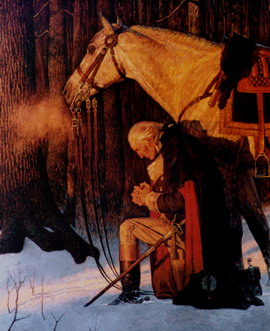04 Aug George Washington & Spiritual Tyranny
 As we begin the final week of our month-long series on the Founding Fathers, Spirituality, and Religion, we turn our attention to George Washington, the commander of the Continental Army during the Revolutionary War, and of course the first President of The United States. A fierce advocate of personal liberties, General Washington worried over the tyranny of establishments and institutions in all matters, especially regarding politics and religion.
As we begin the final week of our month-long series on the Founding Fathers, Spirituality, and Religion, we turn our attention to George Washington, the commander of the Continental Army during the Revolutionary War, and of course the first President of The United States. A fierce advocate of personal liberties, General Washington worried over the tyranny of establishments and institutions in all matters, especially regarding politics and religion.
As such, Washington belonged to no political party and in fact wished that America would not form parties, not simply out of a fear of tyrrany but also because he felt a party system would encourage conflict and prevent governments from getting things done. Looking at the current sad state of political affairs, we see that Washington’s concerns were very prescient.
The following passage is from a letter dated May 10, 1789, written to the United Baptist Churches in Virginia. Here we find Washington emphasizing that we worship by the dictates of our own consciences, not by the dictates of organized church bodies or religious establishments, which are more than capable of inflicting spiritual tyranny on their congregations. Washington held the belief (common among many of the Founding Fathers) that the individual alone is responsible for his or her relationship to God.
If I could have entertained the slightest apprehension that the Constitution framed in the Convention, where I had the honor to preside, might possibly endanger the religious rights of any ecclesiastical society, certainly I would never have placed my signature to it; and if I could now conceive that the general government might ever be so administered as to render the liberty of conscience insecure, I beg you will be persuaded that no one would be more zealous than myself to establish effectual barriers against the horrors of spiritual tyranny, and every species of religious persecution.
For you, doubtless, remember that I have often expressed my sentiment, that every person, conducting themselves as a good citizen, and being accountable to God alone for their religious opinions, ought to be protected in worshiping the Deity according to the dictates of their own conscience.
